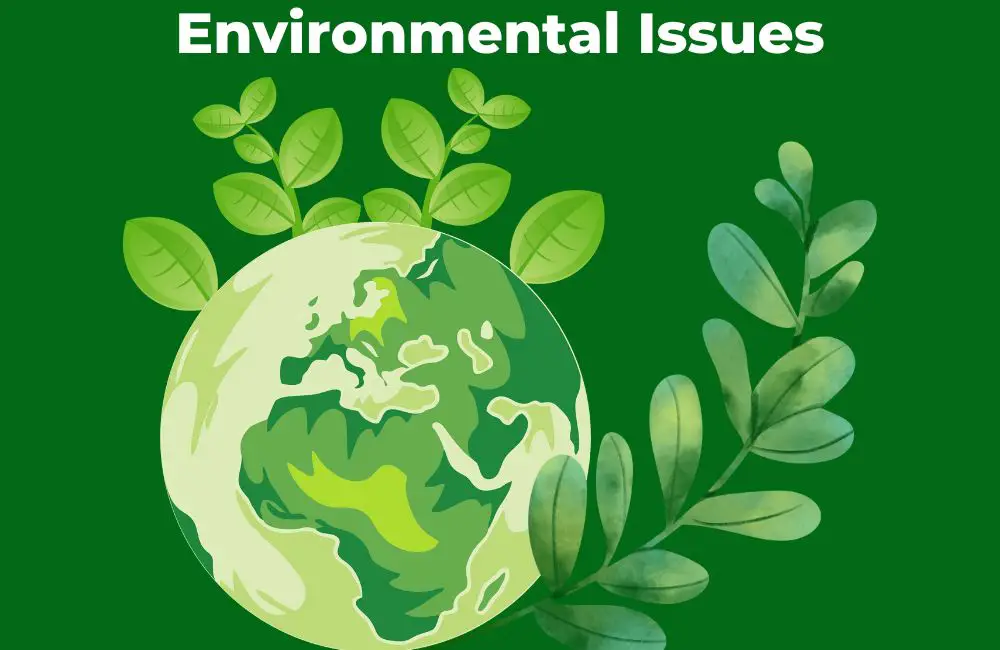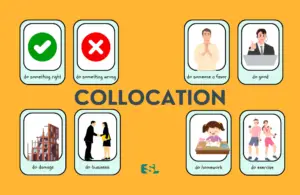Language is a powerful tool in any field, and it is no less important when it comes to discussing environmental issues. Knowing the right terms can help you better understand the complex and critical conversations happening around the world about our planet’s health.
Whether you’re an environmental activist, a student, or someone who wants to stay informed about the latest developments, this article will provide you with an essential glossary of terms related to environmental issues.
To elevate your vocabulary in just 30 days, I recommend to my students an informative, fun, and accessible guide to utilizing powerful language. Millions of individuals have enhanced their academics, job skills, and confidence by dedicating just fifteen minutes daily to the exercises and tests of 30 Days to a More Powerful Vocabulary (Amazon Link), a top-selling. It offers step-by-step methods to bolster language prowess, discover compelling words, and daily vocabulary enhancement with pronunciation guidance.
Table of Contents
- 1. Basic Environment-related Terms
- 2. Climate Change-related Vocabulary
- 3. Waste Management Vocabulary
- 4. Water-related Vocabulary
- 5. Air Quality Vocabulary
- 6. Energy Vocabulary
- 7. Eco-friendly Vocabulary
- Sample Conversation: Using Vocabulary for Environmental Issues
- In Conclusion
- FAQ: Vocabulary for Environmental Issues
1. Basic Environment-related Terms
Here, we’ll cover some basic words and phrases that are frequently used when talking about the environment.
| Word/Phrase | Meaning/Usage | Example Sentences |
|---|---|---|
| Ecosystem | A biological community of interacting organisms and their physical environment | “Coral reefs are one of the most diverse ecosystems on the planet.” |
| Biodiversity | The variety of life in the world or in a particular habitat or ecosystem | “The rainforests are known for their high biodiversity.” |
| Habitat | The natural home or environment of an animal, plant, or other organism | “Deforestation is causing the loss of wildlife habitats.” |
| Endangered Species | A species of animal or plant that is seriously at risk of extinction | “The giant panda is an endangered species.” |
| Conservation | The preservation or efficient use of resources | “Water conservation is crucial in dry regions.” |
| Pollution | The introduction of harmful substances or products into the environment | “Air pollution in the city is at an all-time high.” |
| Renewable Resources | Natural resources that can be replaced naturally in a short period of time | “Wind and solar energy are examples of renewable resources.” |
| Non-renewable Resources | Resources that do not renew themselves at a sufficient rate for sustainable economic extraction | “Coal and oil are non-renewable resources.” |
| Emissions | Substances discharged into the air (usually by gas or smoke from factories, cars, etc.) | “Many cities are taking measures to reduce carbon emissions.” |
| Deforestation | The action of clearing a wide area of trees | “Deforestation in the Amazon rainforest threatens many wildlife species.” |
2. Climate Change-related Vocabulary
This section will cover words and phrases related to climate change, one of the most critical environmental issues of our time.
| Word/Phrase | Meaning/Usage | Example Sentences |
|---|---|---|
| Global Warming | The long-term heating of Earth’s climate system due to human activities | “Global warming is causing sea levels to rise.” |
| Greenhouse Effect | The trapping of the sun’s warmth in a planet’s lower atmosphere due to the greater transparency of the atmosphere to visible radiation from the sun than to infrared radiation emitted from the planet’s surface | “The greenhouse effect is amplified by the increased levels of carbon dioxide in the atmosphere.” |
| Carbon Footprint | The total amount of greenhouse gases produced by an individual, event, organization, or product | “By cycling to work, you can reduce your carbon footprint.” |
| Carbon Neutral | Achieving net zero carbon dioxide emissions by balancing carbon emissions with carbon removal | “The company aims to be carbon neutral by 2030.” |
| Fossil Fuels | Natural fuels formed in the geological past from the remains of living organisms (e.g., coal, oil, gas) | “Burning fossil fuels contributes to global warming.” |
| Climate Change Denier | A person who denies the evidence that climate change is occurring or that it is caused by human activity | “Climate change deniers are a hurdle to environmental policies.” |
| Renewable Energy | Energy from a source that is not depleted when used, such as wind or solar power | “Many countries are shifting towards renewable energy.” |
| Sea-Level Rise | The increase in sea level due to global warming | “Sea-level rise is threatening coastal communities.” |
| Climate Adaptation | The process of adjustment to actual or expected climate and its effects | “Climate adaptation strategies are necessary for regions prone to drought.” |
| Climate Mitigation | Efforts to reduce or prevent emission of greenhouse gases | “Planting trees is one strategy for climate mitigation.” |
3. Waste Management Vocabulary
This section introduces terms related to waste management, a crucial part of maintaining a clean environment.
| Word/Phrase | Meaning/Usage | Example Sentences |
|---|---|---|
| Recycle | Convert (waste) into reusable material | “Remember to recycle your paper and plastic products.” |
| Compost | Decayed organic material used as a plant fertilizer | “You can compost your kitchen scraps.” |
| Landfill | A place to dispose of refuse and other waste material by burying it and covering it over with soil | “The city’s landfill is almost full.” |
| Biodegradable | Capable of being decomposed by bacteria or other living organisms | “Choose biodegradable products whenever possible.” |
| Incineration | The destruction of waste by burning | “Incineration of waste can produce harmful emissions.” |
| Hazardous Waste | Waste that has substantial or potential threats to public health or the environment | “Hazardous waste must be disposed of properly.” |
| Electronic Waste (E-Waste) | Discarded electronic devices or components of these devices | “Your old phone is considered electronic waste.” |
| Waste Reduction | Actions that reduce the amount of waste that is produced | “Waste reduction can be achieved by using reusable shopping bags.” |
| Waste Segregation | Separating different types of waste according to their nature | “Waste segregation makes recycling more efficient.” |
| Zero-Waste | A philosophy that encourages the redesign of resource life cycles so that all products are reused | “She leads a zero-waste lifestyle to reduce her impact on the environment.” |
4. Water-related Vocabulary
Water is a vital resource for all life on Earth. These terms help to understand the issues related to water usage and conservation.
| Word/Phrase | Meaning/Usage | Example Sentences |
|---|---|---|
| Aquifer | A body of permeable rock which can contain or transmit groundwater | “The town’s water supply comes from an underground aquifer.” |
| Desalination | The process of removing salt from seawater | “Desalination plants can provide water in areas where freshwater is scarce.” |
| Drought | A prolonged period of abnormally low rainfall | “The drought has devastated local farmers.” |
| Groundwater | Water held underground in the soil or in pores and crevices in rock | “The well provides access to clean groundwater.” |
| Hydroelectric Power | Electricity generated by the energy of moving water | “The dam was built to provide hydroelectric power.” |
| Irrigation | The supply of water to land or crops to help growth | “Proper irrigation is essential for the vineyard.” |
| Rainwater Harvesting | The accumulation and storage of rainwater for reuse | “Rainwater harvesting can help conserve water.” |
| Water Conservation | The practice of using water efficiently to reduce unnecessary water usage | “Water conservation techniques are necessary in arid regions.” |
| Water Contamination | The presence of toxic chemicals or biological agents in water | “The water contamination was caused by a factory leak.” |
| Water Scarcity | The lack of sufficient available water resources to meet the demands within a region | “Water scarcity in the region is a growing concern.” |
5. Air Quality Vocabulary
Understanding the quality of the air we breathe is crucial. Here are some terms that can help with that understanding.
| Word/Phrase | Meaning/Usage | Example Sentences |
|---|---|---|
| Air Quality Index (AQI) | A number used by government agencies to communicate to the public how polluted the air currently is or how polluted it is forecast to become | “The AQI in the city is at a dangerous level today.” |
| Emission Standards | The legal requirements governing air pollutants released into the atmosphere | “The new cars meet strict emission standards.” |
| Greenhouse Gases (GHGs) | Gases that trap heat in the atmosphere, such as carbon dioxide and methane | “Human activities are increasing the concentration of greenhouse gases in the atmosphere.” |
| Ozone Layer | A layer in the earth’s stratosphere that absorbs most of the sun’s ultraviolet radiation | “The ozone layer is being depleted by chemical pollutants.” |
| Particulate Matter (PM) | Microscopic particles in the air that can be inhaled and cause health problems | “The factory’s emissions contain high levels of particulate matter.” |
| Smog | Fog or haze combined with smoke and other atmospheric pollutants | “The city is often covered in smog.” |
| Sustainable Transport | Transportation methods that are environmentally friendly | “Cycling and public transport are forms of sustainable transport.” |
| Clean Air Act | A United States federal law designed to control air pollution | “The Clean Air Act has led to significant improvements in air quality.” |
| Acid Rain | Rainfall made sufficiently acidic by atmospheric pollution that it causes environmental harm | “Acid rain is damaging the forests.” |
| Air Purifier | A device which removes contaminants from the air in a room | “Many people use air purifiers to improve indoor air quality.” |
6. Energy Vocabulary
Energy production and use is a significant contributor to environmental issues. These terms can help us understand more about it.
| Word/Phrase | Meaning/Usage | Example Sentences |
|---|---|---|
| Biofuel | A fuel derived directly from living matter | “The use of biofuel can help reduce carbon emissions.” |
| Energy Efficiency | The goal to reduce the amount of energy required to provide products and services | “Upgrading to energy-efficient appliances can reduce your electricity bill.” |
| Fracking | The process of injecting liquid at high pressure into subterranean rocks to force open existing fissures and extract oil or gas | “There is controversy over the environmental impacts of fracking.” |
| Geothermal Energy | Heat energy generated and stored in the Earth | “Geothermal energy is a renewable resource.” |
| Solar Power | Power obtained by harnessing the energy of the sun’s rays | “Many homes are now equipped with solar power systems.” |
| Wind Power | Power obtained by harnessing the energy of the wind | “Wind power is an increasingly popular form of renewable energy.” |
| Nuclear Energy | Energy released during nuclear fission or fusion, especially when used to generate electricity | “Despite its potential, nuclear energy carries risks of accidents and the problem of nuclear waste.” |
| Energy Grid | An interconnected network for delivering electricity from producers to consumers | “The energy grid needs to be updated to handle more renewable energy.” |
| Peak Demand | The highest point of consumption in a billing period | “Energy companies have to be prepared for peak demand periods.” |
| Power Plant | An industrial facility for the generation of electric power | “The power plant uses coal to generate electricity.” |
7. Eco-friendly Vocabulary
Eco-friendly or green vocabulary is vital to understand how our choices and behaviors can impact the environment.
| Word/Phrase | Meaning/Usage | Example Sentences |
|---|---|---|
| Sustainability | The practice of using natural resources responsibly, so they can be maintained for future generations | “Sustainability is at the heart of our company’s mission.” |
| Carbon Offset | A reduction in emissions of carbon dioxide made in order to compensate for emissions made elsewhere | “You can buy a carbon offset to balance out your flight emissions.” |
| Organic | (Of food or farming methods) produced or involving production without the use of chemical fertilizers, pesticides, or other artificial agents | “I prefer to buy organic fruits and vegetables.” |
| Veganism | The practice of abstaining from the use of animal products, particularly in diet | “Veganism can be a powerful tool for reducing one’s environmental impact.” |
| Upcycling | The process of transforming by-products, waste materials, useless, or unwanted products into new materials or products of better quality or for better environmental value | “She upcycles old clothes into stylish new pieces.” |
| Greenwashing | The practice of making an unsubstantiated or misleading claim about the environmental benefits of a product, service, or company | “Many companies are guilty of greenwashing to attract eco-conscious consumers.” |
| Fair Trade | A system of trade in which workers receive fair wages and working conditions | “Buying fair trade products can help support farmers in developing countries.” |
| Composting | The process of converting kitchen and garden waste into valuable and nutrient-rich soil conditioner | “Composting at home is an easy way to reduce food waste.” |
| Eco-Friendly | Not harmful to the environment | “More consumers are looking for eco-friendly alternatives to single-use plastic.” |
| Natural Resource Management | The management of natural resources such as land, water, soil, plants and animals, with a focus on how management affects the quality of life for both present and future generations | “Effective natural resource management can help preserve biodiversity.” |
If you are searching for an effective English language vocabulary builder, try Word Power Made Easy: The Complete Handbook for Building a Superior Vocabulary (Amazon Link). This time-tested classic has helped millions achieve mastery of English and improve their communication skills in business, the classroom, and in life.
Sample Conversation: Using Vocabulary for Environmental Issues
Situation: At a community meeting about local environmental initiatives, Jamie and Taylor discuss the pressing environmental challenges and the role individuals can play.
Jamie: Hi Taylor, it’s great to see so many people interested in “sustainability” and addressing “climate change.” It’s truly the need of the hour.
Taylor: Absolutely, Jamie. With the increasing “carbon footprint” of cities and the threat of “deforestation,” we need to act now. I’ve been trying to reduce my “greenhouse gas emissions” by cycling to work.
Jamie: That’s commendable! Our oceans are also at risk. The “biodiversity” loss due to “overfishing” and “pollution” is alarming.
Taylor: True. And “land degradation” from unsustainable farming practices is affecting food security. We must promote “conservation” and “renewable energy” sources.
Jamie: Agreed. I recently installed solar panels at home. Small steps can lead to significant changes. We need to educate more people about “ecosystem preservation” and the importance of a “circular economy.”
Taylor: Well said, Jamie. Together, we can make a difference and work towards a greener future!
In Conclusion
Understanding the vocabulary of environmental issues is a crucial first step in becoming an informed and active participant in these vital discussions. The words and phrases we’ve covered are just the tip of the iceberg. There’s a whole world of environmental jargon to explore, each term providing a little more insight into our relationship with our planet.
Remember, every conversation we have about the environment is an opportunity to educate and inspire others. So, use your newfound vocabulary to spread awareness and advocate for our Earth. It’s the only one we’ve got!
FAQ: Vocabulary for Environmental Issues
1. What does “sustainability” mean in environmental terms?
“Sustainability” refers to the practice of meeting the needs of the present without compromising the ability of future generations to meet their own needs. It emphasizes long-term ecological balance and responsible resource usage.
2. How does “climate change” impact our planet?
“Climate change” refers to long-term shifts and alterations in temperature and weather patterns, primarily caused by human activities. It leads to rising sea levels, extreme weather events, and loss of biodiversity.
3. What is a “carbon footprint”?
A “carbon footprint” measures the total greenhouse gas emissions caused directly or indirectly by an individual, organization, event, or product. It represents the impact one has on the environment.
4. Why is “deforestation” a concern?
“Deforestation” is the removal or clearing of forests without replanting. It results in habitat loss, reduced biodiversity, and contributes to global climate change.
5. How do “greenhouse gas emissions” affect the environment?
“Greenhouse gas emissions,” like carbon dioxide and methane, trap heat in the Earth’s atmosphere. This leads to global warming, affecting weather patterns, sea levels, and ecosystems.
6. What is “biodiversity”?
“Biodiversity” refers to the variety of life on Earth, including the different species of plants, animals, and microorganisms, the genetic differences within these species, and the ecosystems they form.
7. How does “overfishing” impact the marine ecosystem?
“Overfishing” is the removal of fish from a body of water at a rate that the species can’t replenish. This disrupts the food chain, affects marine biodiversity, and can lead to fish depletion.
8. Why is “conservation” important?
“Conservation” involves the protection and preservation of natural resources. It ensures biodiversity, ecological balance, and the availability of these resources for future generations.
9. What are the benefits of “renewable energy” sources?
“Renewable energy” sources, like wind, solar, and hydro, are inexhaustible and produce little to no greenhouse gases. They reduce dependence on fossil fuels, decreasing pollution and environmental degradation.
10. What is a “circular economy”?
A “circular economy” is an economic system aimed at minimizing waste and making the most of resources. It emphasizes recycling, reusing, and refurbishing to extend product lifespans and reduce environmental impact.





